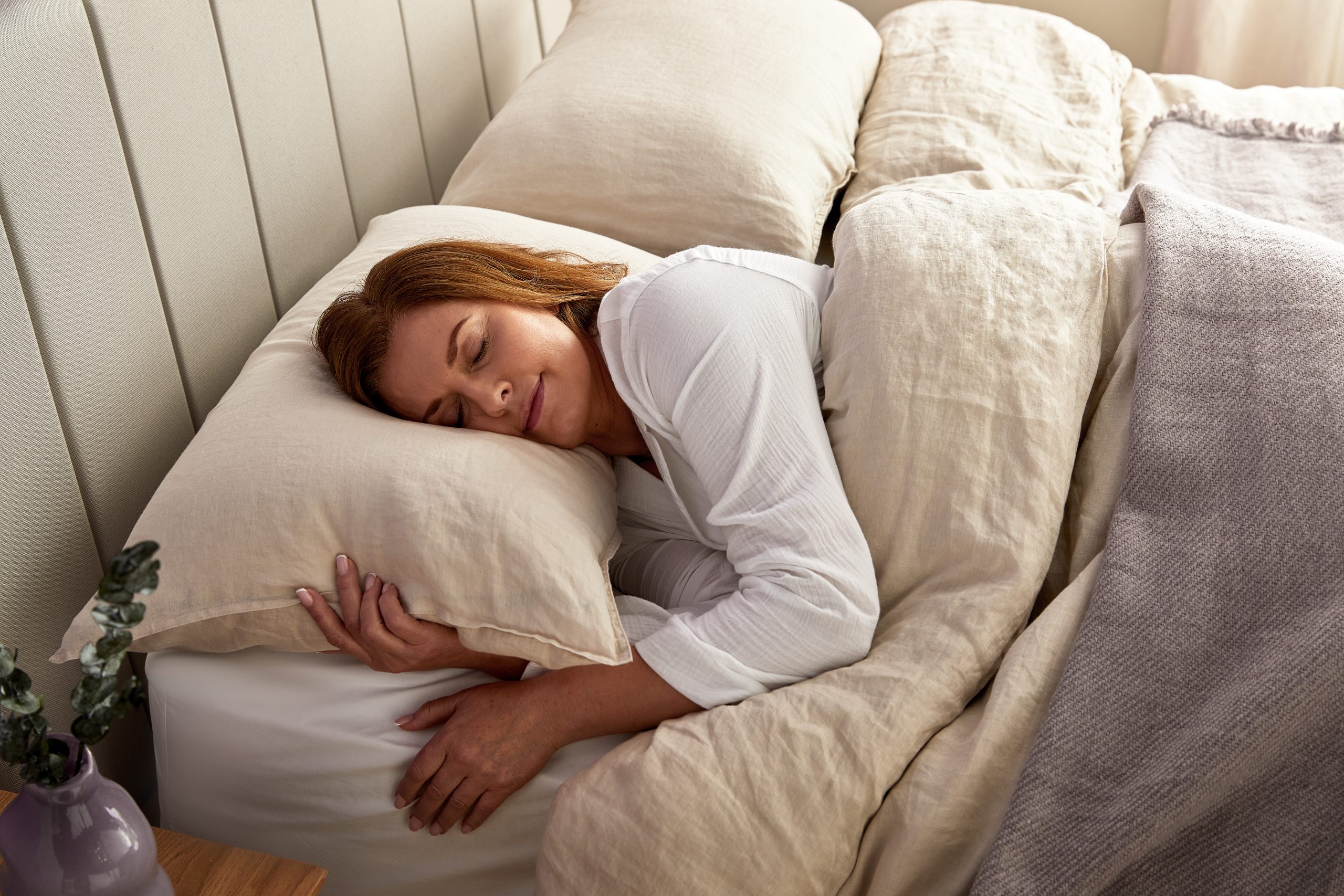Silentnight is one of the most beloved brands stocked at QVC, offering a considered edit of bedding, mattresses, furniture and accessories all designed to help you sleep better.
We sat down with Hannah Shore, Sleep Knowledge and Research Manager, to find out how sleep changes in menopause, along with top tips to support your sleep using some of these superb Silentnight products.
All about hormones
The menstrual cycle comes to an end due to a change in hormones. Throughout the menstrual cycle, there is a regulation of hormones defined by the changes in two particular hormones; Follicle-Stimulating Hormone (FSH) and Luteinizing Hormone (LH). These in turn effect the production of steroid hormones oestrogen and progesterone. The beginning of the menstrual cycle sees a slight rise in FSH which causes ovarian follicles to enlarge and produce oestrogen levels to rise through the first half of the cycle called the Follicular Phase.
When oestrogen levels come to a peak this prompts the second half of the 28 day cycle, called the Luteal Phase. The increase in oestrogen instigates a reduction of FSH and a sudden release of LH which prompts oestrogen to decline in production and sees progesterone as the dominant hormone throughout these days.
During the menopause we see significant changes in these hormones. The onset of menopause sees the ovaries become less responsive to FSH with a decrease in the stimulation of ovarian follicles. This in turn reduces the amount of oestrogen that is produced. As there is a lack of oestrogen it means the body continues to produce FSH so we see increased levels of FSH and decreased levels of oestrogen throughout the menopause.
Along with the reduction in oestrogen and FSH we also see progesterone gradually decreasing in production with age. It is suggested that these changes in hormones cannot just have physiological effects on the body, the menopause also sees an increase of psychological issues such as depression and sociocultural factors such as religion, financial anxiety and the future.
How these hormones affect sleep
Oestrogen
Oestrogen can directly affect sleep architecture, the amount of time we spend in each different stage of sleep. Oestrogen has a direct impact on REM sleep, lighter sleep which is responsible for learning, memory consolidation and emotional processing. A reduction of oestrogen can cause people to find it difficult to fall asleep and stay asleep.
Progesterone
Progesterone helps to regulate our core body temperature. Temperature is important when it comes to sleep, in order to get access to that good quality sleep we need, our core body temperature needs to drop by a couple of degrees. It has also been suggested that progesterone is related to NREM sleep, a deeper stage of sleep which is responsible for repairing the body and flushing out any build up of toxins from the previous day. Therefore dysregulation of progesterone can cause spikes in core body temperature and a lighter more fractured sleeping pattern.
Tips for a better night’s sleep
We are not going to stop menopause from happening, the dysregulation of hormones and their effect will still happen, however we may be able to deal with some of the side effects which reduce our sleep. The main area we should focus on is temperature control. Around 75% of menopausal women will suffer from vasomotor symptoms such as hot flashes and night sweats and there are lots of ways in which we can cool our bedroom down:
- Loose fitted PJ’s, preferably with something that helps to wick away moisture, natural fibres like bamboo.
- Keep a spare pair of PJs easily accessible in case we need to change in the middle of the night. This way we are not routing through draws which may wake us up further.
- Damp flannel on the bedside table.
- Fan with a remote so you can easily adjust the settings.
- Use separate duvets if you share a bed, you are then creating your own microclimate and your partner isn’t adding to the heat.
- Use a lower tog duvet.
- Avoid products with foam in them, foam holds on to heat and moisture and can therefore feel as though you are sleeping on a hot water bottle. Instead, opt for more breathable solutions such as polyester or natural fibres.
- If you cannot sleep, get up. The worst thing to do is to lay there still and stress and worry about not getting enough sleep. Stress and worry will cause your body to think it is in danger and start producing wake promoting hormones such as cortisol, which means you will find it more difficult to get back to sleep. Try to do something to take your mind off it, such as completing your winddown routine again, this might consist of reading a book or listening to a podcast.
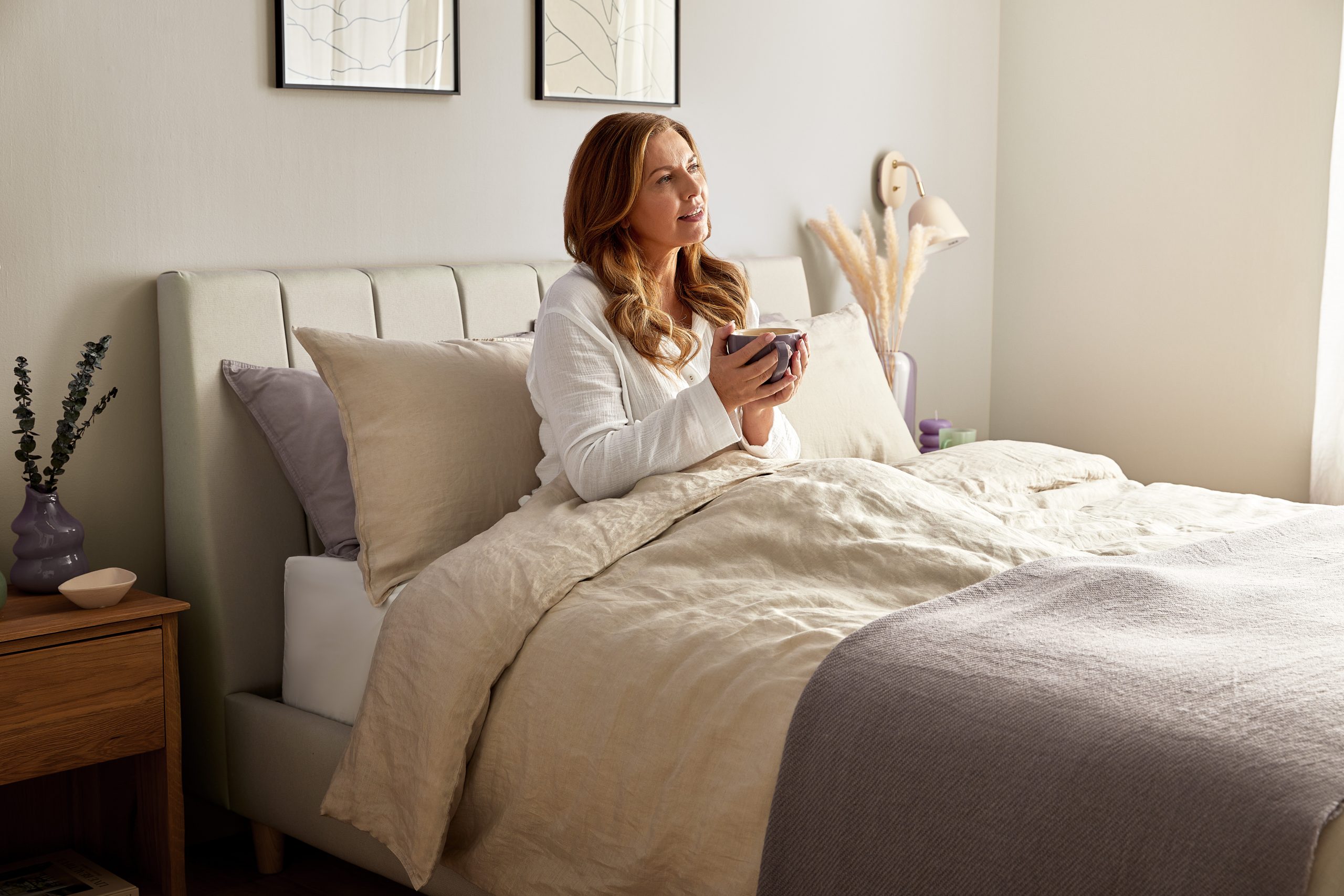
Discover the Silentnight Lift Breathe range
If getting a peaceful sleep is high on your list of priorities, but you’ve been struggling with hot flushes and night sweats, then you’ll be pleased to hear that Silentnight have developed a mattress that is scientifically proven to help reduce symptoms of menopause.
Silentnight’s Lift Breathe Mattress works in four ways: the Intense sleep surface works to reduce cortisol levels and morning stress, while the platinum pad is a breathable alternative to foam (but just as comfortable). The breathable sleep system is ideal if you get hot in the night or struggle with night sweats, and the Mirapocket spring-zoned support helps to soothe aches and pains.
Night sweats and hot flushes are one of the most recognisable menopause symptoms (and you can find out more about them here). The mattress works to enhance breathability and transports heat and moisture away from your body, and it’s hypoallergenic too.
You can purchase the mattress on its own, in four size options – and we also have it available as a divan bed in a choice of stylish, contemporary shades to suit your home.
Find out more about the range here.
Explore the Restore by Silentnight range
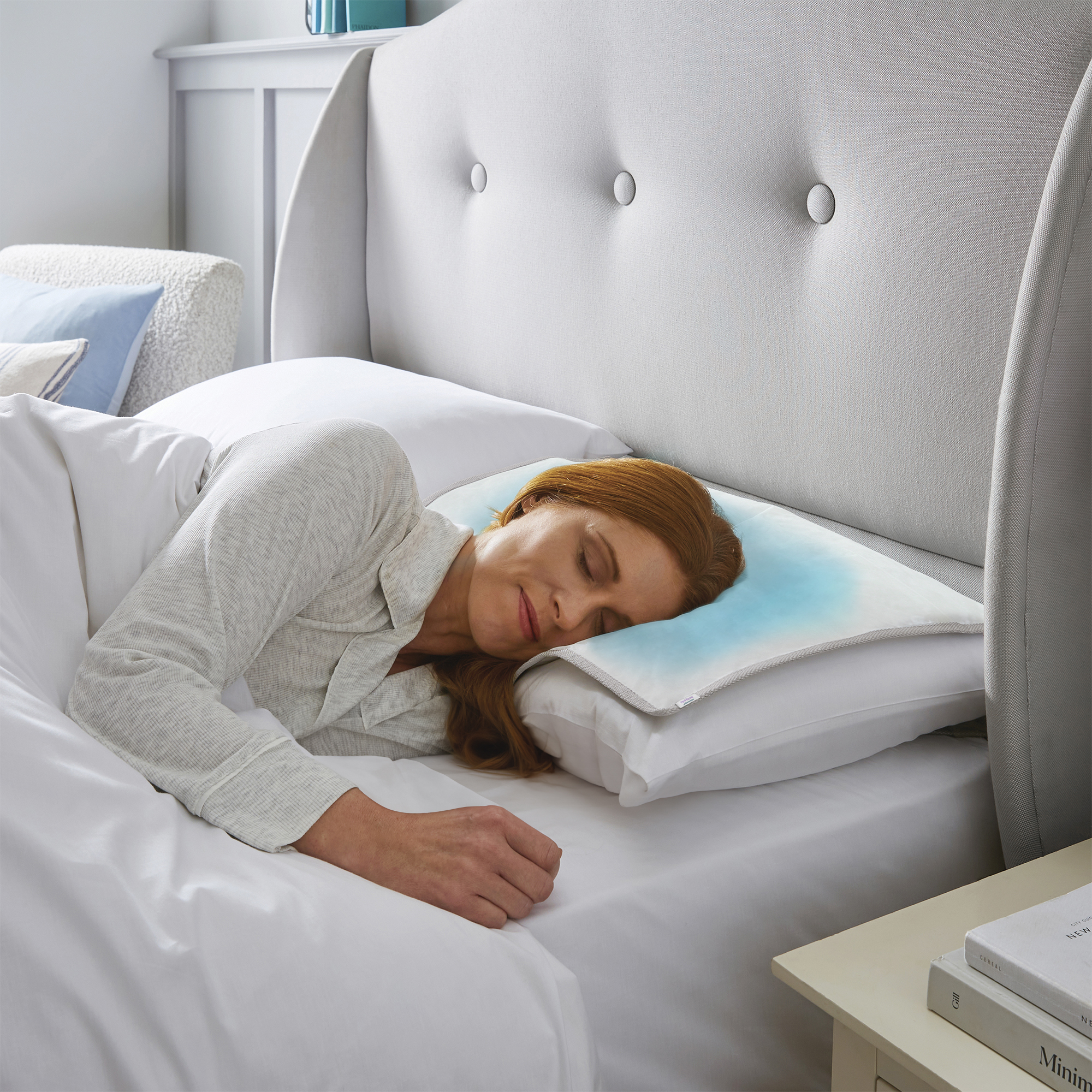
Perfect for restless sleepers and over-heaters, the Restore range by Silentnight is designed by women, for women, to help reduce the effects of the menopause on sleep.
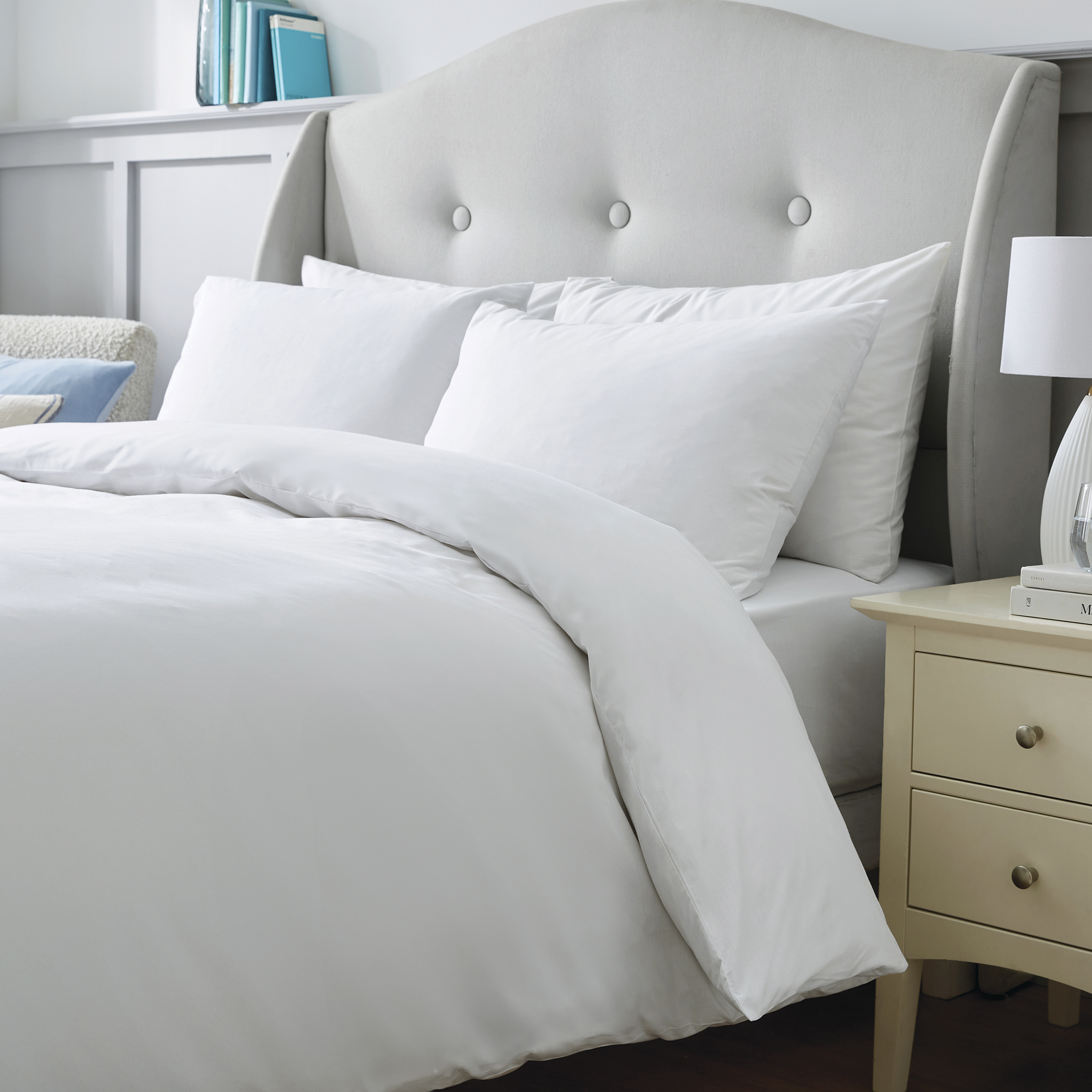
With 4 out of 5 women experiencing sleep issues as a key menopause symptom, the range of cooling and breathable products is designed to aid relaxation and reduce the effects of common menopause symptoms including hot flushes and night sweats that can contribute to over 2.5 hours of lost sleep a night.
Offers instant cooling relief as well as all the natural health benefits of copper. Made with innovative cool sensation fabrics, it’s the perfect solutions for menopausal night sweats.
Cooling Gel Pillow Pad
Provides instant cooling comfort, with no pillow flipping needed! Designed to cover your entire pillow. Simply pop it inside your pillowcase on top of your normal pillow, or just on the top.
Cooling Lightweight Blanket
Made with innovative cool sensation fabric and breathable jersey cotton. Perfect for use on the sofa or as a replacement for your standard duvet.
Cooling Weighted Blanket
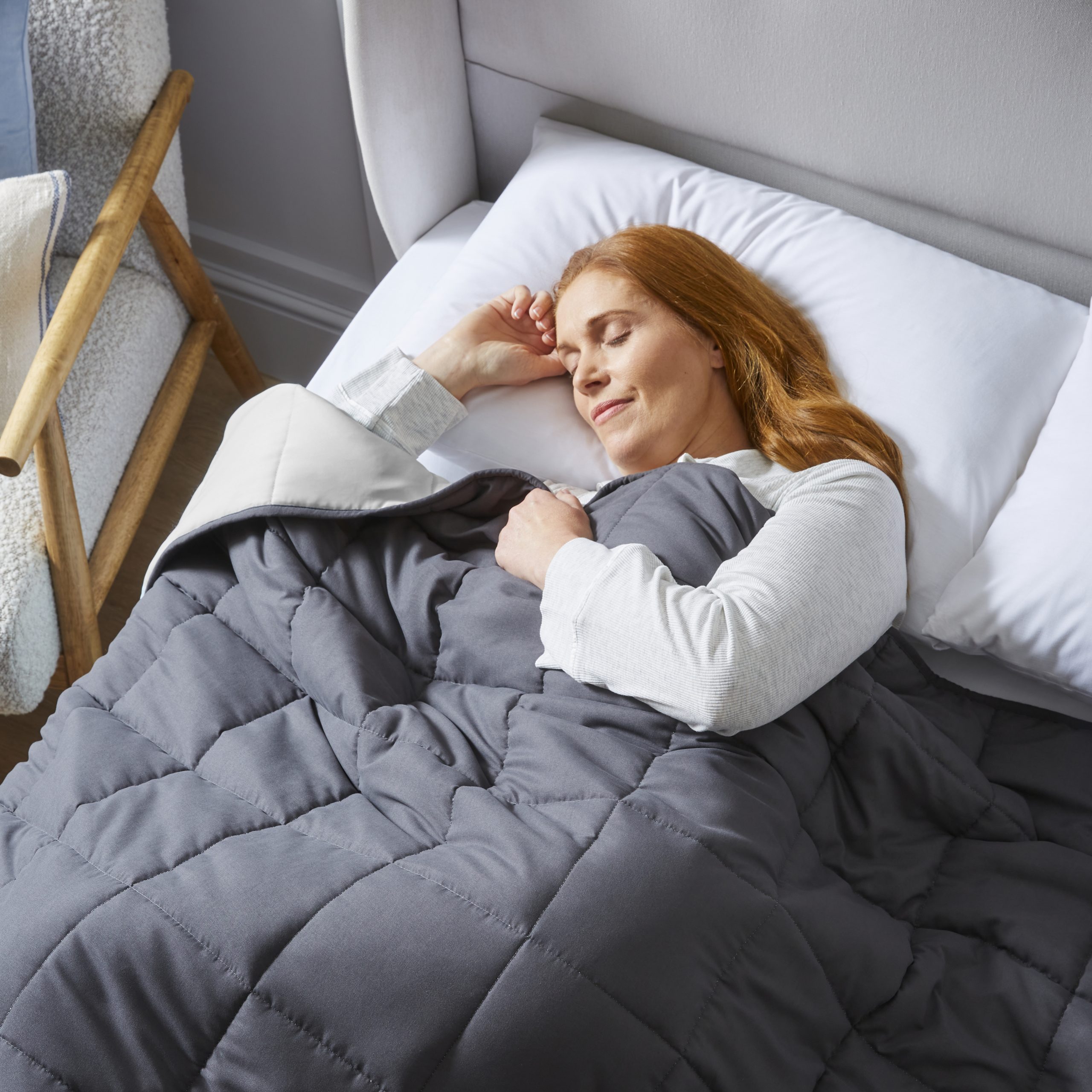
Pairs deep touch pressure with innovative cool treated fabric that helps combat overheating and reduce anxiety.
Natural Breathable Duvet Set
Made from a blend of naturally breathable bamboo and cotton fibres, perfect for a refreshing and comfortably cool night’s sleep.
Make sure to tune into QVC Live or shop via the app on Monday 11th March for our Big Deal featuring the Restore by Silentnight Cooling Lightweight Blanket (item number 831539), available at an unmissable price for a limited time.
For more stories, advice and interviews, head to the Menopause Your Way Stories hub. To browse and shop a curated edit of menopause products, visit the Menopause Your Way page on QVC.
The content of the QVC website is for information only. It is not intended as a substitute for professional medical advice, diagnosis or treatment. Always seek the advice of your doctor or other qualified health provider with any questions you may have regarding a medical condition. Never disregard professional medical advice or delay in seeking it because of something you have read on the QVC website.
We understand there’s a lot of information out there on the menopause. You can read through the NICE guidance on menopause management, as well as the NHS overview on the menopause.

